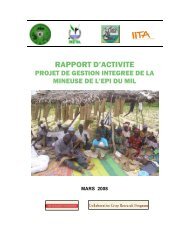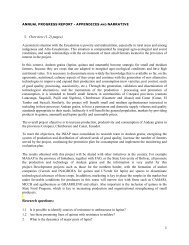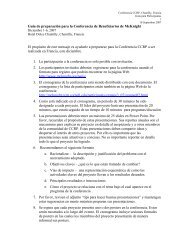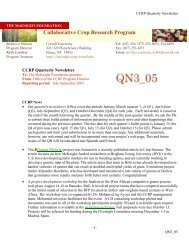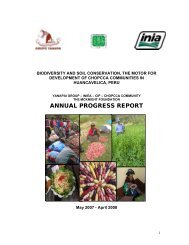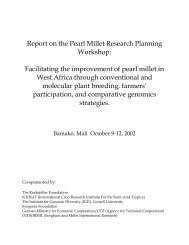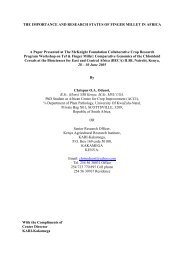English - McKnight Foundation Collaborative Crop Research Program
English - McKnight Foundation Collaborative Crop Research Program
English - McKnight Foundation Collaborative Crop Research Program
Create successful ePaper yourself
Turn your PDF publications into a flip-book with our unique Google optimized e-Paper software.
<strong>McKnight</strong> <strong>Foundation</strong> <strong>Collaborative</strong> <strong>Crop</strong>s <strong>Research</strong> Project No: 06-741<br />
503-1, IT97K-825-15, IT99K-7-21-2-2-1, IT99K-494-6, and two released varieties Sudan -1, IT82E-16<br />
and one farmers’ local cultivar were evaluated against five main criteria, which are; seed size, plant<br />
type, early maturity, insect resistance and disease resistance. Note that varieties Sudan -1 and IT82E-16<br />
were included for counterchecking with introduced lines. Preliminary description of the lines is<br />
presented in Table 5.<br />
Table 5: Brief descriptions of the entries under evaluations in 2008/09 season, Malawi.<br />
Code Name Description<br />
5 IT98K-503-1 Has good yield on overall, medium seed size, very good Alectra vogelii<br />
resistance<br />
37 IT97K-825-15 Good Alectra resistance, fair yield, medium seed size, low farmer<br />
preference<br />
9 IT99K-7-21-2-2- Best Alectra resistance in ’07, ‘07/08, good seed size, medium seed size,<br />
1<br />
good yield<br />
21 IT99K-494-6 Medium yield, good Alectra resistance in ‘06/07, ‘07/08, medium seed size,<br />
low farmer preference<br />
53 Sudan -1 Released variety, good resistance to Alectra and good yielder in ‘07/08<br />
52 IT82E-16 This is a released variety. Yielded second best across sites in 07/08. Poor<br />
resistance to A. vogelii. Well liked by farmers.<br />
54 Farmers’ local Collected from around trial sites, usually bushy and long maturing.<br />
Results of analysis show preference on the following order. Sudan 1 is most preferred followed by<br />
IT82E-16, IT99K-7-21-2-2-1, IT98K-503-1 and IT99K-494-6. Lines IT97K-825-15 followed by<br />
farmers’ local are less preferred as indicated above. Since Sudan 1 and IT82E-16 are already released,<br />
varieties IT99K-7-21-2-2-1, IT98K-503-1 and IT99K-494-6 may be considered for further genetic<br />
perfection on-station with a possibility of releasing them commercially starting with line IT99K-7-21-2-<br />
2-1.<br />
Geographic variability in host response to A. vogelii<br />
Studies undertaken in pot experiment at Long Ashton UK indicate that at a species level there<br />
are 3 strains of Alectra by host range:<br />
1. Alectra from Singida attaches and emerges on cowpea and groundnut but not on mung or common<br />
bean.<br />
2. Alectra from Bihawana and probably Ismani attaches and emerges on cowpea, groundnut, common<br />
bean but not on mung bean<br />
3. Alectra from Malawi sites attaches and emerges on cowpea, groundnut, common bean and mung<br />
bean.<br />
Within cowpea, patterns of virulence were also observed to be evident: Alectra from all sites in both<br />
countries emerges on IT36E-16 and TZA 263 but not on B301.<br />
1. Alectra from Bunda and Kasungu emerges on ITK1207, IT97K 818-35, IT97K819-118 and IT<br />
99K7-21-2-2-1<br />
2. Alectra from Zomba emerges on ITK1207, IT97K 818-35, IT97K819-118 but not on IT 99K7-21-<br />
2-2-1 (this result for IT 99K7-21-2-2-1 same as in 2008 pot trial).<br />
3. Alectra from Singida and Ismani does not emerge on ITK1207, IT97K 818-35, IT97K819-118 and<br />
IT 99K7-21-2-2-1 (result for Singida same as in 2008 trial)<br />
4. Alectra from Bihawana emerges on IT 99K7-21-2-2-1 but not on ITK1207, IT97K 818-35 and<br />
IT97K819-118.<br />
In Tanzania it appears that Alectra from Singida has a narrower species host range and less virulent on<br />
the cowpea lines tested than Alectra from other sites. Bihawana Alectra provides a "universal" test for<br />
9<br />
2009



